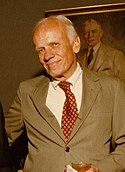Walker Percy Quote
Why do people often feel bad in good environments and good in bad environments? Why did Mother Teresta think that affluent Westerners often seemed poorer than the Calcutta poor, the poorest of the poor?The paradox comes to pass because the impoverishments and enrichments of a in a are not necessarily the same as the impoverishments and enrichments of an in an .The organism is needy or not needy accordingly as needs are satisfied or not satisfied by its environment.The self in a world is rich or poor accordingly as it succeeds in identifying its otherwise unspeakable self, e.g., mythically, by identifying itself with a world-sign, such as a totem; religiously, by identifying itself as a creature of God...In a post-religious age, the only recourses of the self are self as transcendent and self as immanent.The impoverishment of the immanent self derives from a perceived loss of sovereignty to them, the transcending scientists and experts of society. As a consequence, the self sees its only recourse as an endless round of work, diversion, and consumption of goods and services. Failing this and having some inkling of its plight, it sees no way out because it has come to see itself as an organism in an environment and so can't understand why it feels so bad in the best of all possible environments--say, a good family and a good home in a good neighborhood in East Orange on a fine Wednesday afternoon--and so finds itself secretly relishing bad news, assassinations, plane crashes, and the misfortunes of neighbors, and even comes secretly to hope for catastrophe, earthquake, hurricane, wars, apocalypse--anything to break out of the iron grip of immanence.
Why do people often feel bad in good environments and good in bad environments? Why did Mother Teresta think that affluent Westerners often seemed poorer than the Calcutta poor, the poorest of the poor?The paradox comes to pass because the impoverishments and enrichments of a in a are not necessarily the same as the impoverishments and enrichments of an in an .The organism is needy or not needy accordingly as needs are satisfied or not satisfied by its environment.The self in a world is rich or poor accordingly as it succeeds in identifying its otherwise unspeakable self, e.g., mythically, by identifying itself with a world-sign, such as a totem; religiously, by identifying itself as a creature of God...In a post-religious age, the only recourses of the self are self as transcendent and self as immanent.The impoverishment of the immanent self derives from a perceived loss of sovereignty to them, the transcending scientists and experts of society. As a consequence, the self sees its only recourse as an endless round of work, diversion, and consumption of goods and services. Failing this and having some inkling of its plight, it sees no way out because it has come to see itself as an organism in an environment and so can't understand why it feels so bad in the best of all possible environments--say, a good family and a good home in a good neighborhood in East Orange on a fine Wednesday afternoon--and so finds itself secretly relishing bad news, assassinations, plane crashes, and the misfortunes of neighbors, and even comes secretly to hope for catastrophe, earthquake, hurricane, wars, apocalypse--anything to break out of the iron grip of immanence.
Related Quotes
About Walker Percy
Trained as a physician at Columbia University, Percy decided to become a writer after a bout of tuberculosis. He devoted his literary life to the exploration of "the dislocation of man in the modern age." His work displays a combination of existential questioning, Southern sensibility, and deep Catholic faith. He had a lifelong friendship with author and historian Shelby Foote and spent much of his life in Covington, Louisiana, where he died of prostate cancer in 1990.
